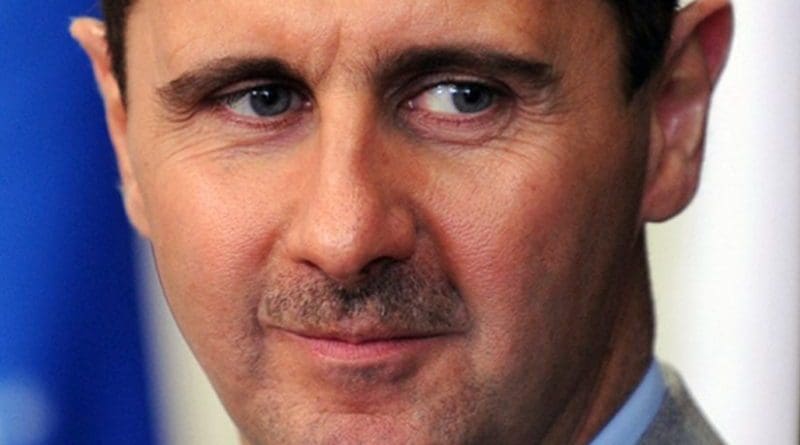Assad Is Accidentally Helping The Kurdish Cause – OpEd
By Ty Joplin
Syria’s President Bashar al-Assad has moved a missile defense system close to Aleppo in northern Syria, preventing Turkish jets from flying over the country.
The move seems to be aimed at protecting Syrian and Russian forces, but it has had a peculiar side effect: Turkey has been forced to cease aerial support for its intervention against Kurdish forces in the Afrin region. In other words, Assad has implemented a de facto no-fly zone, accidentally protecting Kurdish forces and thus empowering the larger Kurdish cause.
If Turkey completely abandons efforts to use its air force to strike against the Kurds for fear of Syria’s defense system and the Kurds are able to hold off Turkish assaults, then Assad will have helped to cement the territorial holdings of a group actively opposed to Assad’s power.
Implementing the No-Fly Zone
On Jan. 20, Turkey launched a military intervention in Afrin, Syria—a Kurdish held region that borders with Turkey. Called Operation Olive Branch, the goal is to oust the Kurdish People’s Protection Units (YPG) militia from the area. The YPG has strong ties to the Kurdistan Worker’s Party (PKK), which is a Kurdish separatist movement based in Turkey. Turkey considers both the YPG and PKK to be terrorist organizations and serious national security threats.
Strangely enough, Syria agreed to allow Turkish forces to enter into Syria’s Idlib province to police the de-escalation agreements and ensure a level of peace and stability in northwestern Syria. Instead, Turkey appeared to use the terms of the deal to establish a foothold in Idlib to help coordinate attacks against Kurdish fighters. Additionally, during the height of the violence in Afrin, Turkey sent military convoys through Idlib towards regime-held territory near Aleppo.
The convoy startled the regime, which sent artillery fire near the convoy to halt its approach, but the regime was forced to back down and let the convoy approach the government territory after Turkey sent jets to escort the convoy.
Even more alarming to the Syrian government, Turkey began building a military outpost mere kilometers from regime-held ground, in a small town named Al-Eis, which Assad has been trying to capture for over two years. The regime and its allies shelled the Turkish position, which provoked a counter-volley from Turkey in an escalation of the Syrian war.
The exchange of artillery fire occurred on Monday. A few days before, a Russian jet was downed by the jihadi umbrella group Hayat Tahrir al-Sham (HTS) near Idlib. Then, potentially in response to the downed jet and the intimidating Turkish air presence near government territory, A commander of the Syrian army announced the deployment of a missile defense system near Aleppo and Idlib.
Signalling that the air defense system is a “message to everyone,” the commander said the defense system covers “the air space of the Syrian north,” which includes the Kurdish-held Afrin region currently besieged by Turkey.
After the Syrian army’s announcement of the defense system, Turkey reportedly halted its air operations over Afrin.
In an attempt to protect his own assets, Assad implemented a de facto no-fly zone.
How Assad Helps the Kurdish Cause
This no-fly zone is providing relief to the YPG, who have already seen the benefits of Assad’s warning against Turkey.
Turkish advances into Afrin appear to have at least temporarily slowed thanks to the lack of air support backing Turkish ground forces, and Kurdish forces are able to re-group and stage attacks without fear of an airstrike or aerial assault. Turkish drones are also reportedly staying away from Syrian airspace, preventing intelligence gathering on Kurdish positions.
The Kurds of Syria have worked to establish autonomous control over ethnically Kurdish areas in northern Syria, and demand a level of power that directly threatens the totalitarian grip on Syria that Assad has been striving to assert.
But Assad seems to think the Turkish threat is more urgent, despite the long-term potential of a drawn out political battle with the Kurds over who has ultimate control over northern Syria, including the oil fields that Kurdish groups captured from ISIS, which form a major part of Syria’s economy.
Ironically, the no-fly zone is a much more tangible protection of the Kurds than what the U.S. is willing to commit to. For its part, the U.S. is firmly stuck between two allies—the Kurds, which were crucial in the fight against ISIS, and Turkey, which is a major economic partner and member of NATO.
The U.S. has let the offensive in Afrin continue, but has warned Turkey not to expand its intervention into Manbij, Syria, where the U.S. has troops on the ground advising Kurdish forces.
In a war where alliances are as fluid as its frontlines, Assad’s accidental sheltering of Kurds from Turkish jets could spell trouble for his regime later on when he must face down a solidified Kurdish national movement.

